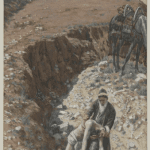 Charity fatigue is evidently real: people are being asked to give to flood relief in Houston, hurricane relief in Florida, and for a variety of local causes. We have so many people we would like to help that we might end up helping nobody.
Charity fatigue is evidently real: people are being asked to give to flood relief in Houston, hurricane relief in Florida, and for a variety of local causes. We have so many people we would like to help that we might end up helping nobody.
The same problem can apply to “causes.” Should we help end the killing of children through legal abortion? Fight racial injustice in the United States? Work to see that the poor are treated with dignity? Help end human trafficking and slavery? If the old rule was to help the person you saw by the side of the road, the Good Samaritan Rule, the entire globe appears in our social media feed! We know about so much suffering without the resources to do anything about most of the problems that we are the Samaritan overwhelmed.
If we are not careful, we will do nothing.
Virtue is hard, though mercy is great. We wish to love better, grow wiser, be just. There are so many ways we could improve, the temptation is to stay as we are. That would be too bad, because though our own virtue will never be enough, being better is pleasant for our family, neighbors, and community!
What to do?
Ideally, we would find a guiding principal that could unite doing charitable works with being charitable! We would know what to do, because our deeds would flow naturally out of who we are. Where can we find such a principle?
A wise man named Maximus the Confessor knew the solution:
There is another way to apprehend this principle, which will be familiar to those who have been taught to approach the logoi in accord with right faith and practice. The essence in every virtue is the one Logos of God — and this can hardly be doubted since the essence of all the virtues is our Lord, Jesus Christ, as it is written: God made Him our wisdom, our righteousness, our holiness, and our redemption [1 Corinthians 1:30]*
We find unity in the virtues in Christ Jesus, but this is more than an idea (as great as that is!), but a person. God became a real person, with the limits of one man, so God knows by experience what a man can do. How should we live? Times change, but virtue remains. Jesus is the essence of all virtues and applies those principles to the world as it is. He takes was is and moves it, slowly so we can stand the change, toward what should be.
In short, we are not left with mere list of ideas, helpful as that would be, but a person who incarnates all those ideas. This is good news. He is there, no longer hidden if we seek Him, and willing to be more than an example. Jesus is willing to come as a person and dwell within us. He repairs us from the inside out.
Why do I find this hard?
It is hard, because I must change. I must give, love, and become different that I am. Jesus rarely picks the order of change that will be obvious to others and bring me glory. Instead, He works slowly to make a deep and lasting difference. Sometimes love will require bringing justice, speaking truth in hard situations, but always changing. What I am is not what I should be. Where to give? Ask. What to do? Ask. Where to change first? Ask. For God so loved the world, the Word, the Sublime Idea, took on a body and came. That was marvelous, but then God sent His Spirit to live in us. Joy is before us. We are always the man by the side of the road to Him and He is always the Samaritan providing for needs. It is out of the help we receive that we can give help.
Jesus is our wisdom, righteousness, holiness, or redemption.
————————————–
* On Difficulties in the Church Fathers, Vol. 1 (The Ambigua) p 103











